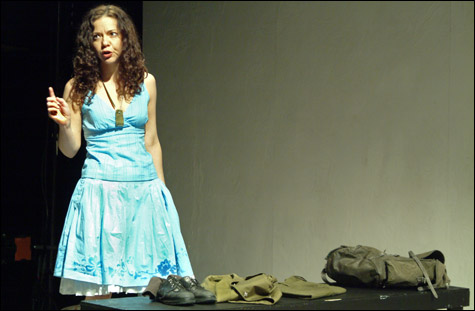Rachel Corrie and Pieces stand off in the Middle East
By CAROLYN CLAY | March 12, 2008

PIECES: What happens after an “Israeli Sandra Bullock” is yanked out of her sky-blue summer frock and into uniform. |
Two young women are coming of age on stage as part of New Repertory Theatre’s “Their Voices Will Be Heard” series (at Arsenal Center for the Arts through March 30). That they’re doing so on opposite sides of the Israel/Palestine divide has made the pairing of My Name Is Rachel Corrie and Pieces something of a political hot potato, with theatergoers warned rather than beseeched with regard to attendance. And there is no doubt that Rachel Corrie — culled from the journals and e-mails of the title character, a 23-year-old American felled by an Israeli bulldozer in Gaza in 2003 — offers pro-Palestinian propaganda. Pieces, which is performed by author Zohar Tirosh, is about her mandatory stint in the Israel army in the mid 1990s. Neither of these one-woman shows is great theater along the lines of Euripides or even David Hare’s Via Dolorosa, which was built on the playwright’s own pilgrimage to the Middle East. But what makes each compelling is its piquant personal journey, not its political agenda.
My Name Is Rachel Corrie is the more publicized and controversial theater piece. Compiled by original director Alan Rickman (yes, Snape!) and Guardian editor Katharine Viner from the writings of the Olympia (Washington) activist who met her death trying to call attention to the fate of Palestinians under Israeli occupation in Gaza, the show opened in 2005 at London’s Royal Court Theatre and transferred to the West End. The indefinite postponement of its scheduled American premiere at New York Theater Workshop engendered a protest that included a letter to the New York Times signed by the likes of Harold Pinter. Although the play was eventually produced in New York, productions in Toronto and Florida were cancelled.
New Rep had scheduled the work to run in tandem with To Pay the Price, which is based on the letters of former Israeli prime minister Benjamin Netanyahu’s older brother, Jonathan, the only Israeli soldier killed in the raid on Entebbe. But the Netanyahu family objected to the pairing, and Pieces was substituted. The two plays are being presented in repertory on a desert-suggestive set by David R. Gammons that’s strewn with symbolic rocks and rubble and nicely lit by Jamie Whoolery, as part of a month-long look at the seemingly unfixable Israeli-Palestinian situation. There are also three staged readings, two film screenings, and a couple of panel discussions. And each performance of Rachel Corrie and Pieces is followed by a talk-back. So there’s a dialogue afoot.
My Name Is Rachel Corrie is colored by our foreknowledge of the fate of the idealistic young woman on whose sometimes air-headed but also impassioned correspondence it’s based. Editors Rickman and Viner do play on the audience’s emotions in this regard, putting forward an energetic, empathetic young American acutely aware of her “white-person privilege” and uncharacteristically needful of a worthy cause that turns out to be the plight of Palestinians in Gaza. (The last we see of our heroine is a video of the actual Rachel Corrie as a 10-year-old advocating for an end to world hunger.)
 Topics
Topics:
Theater
, Politics, Entertainment, Movies, More  , Politics, Entertainment, Movies, Armed Forces, Movie Reviews, Performing Arts, World Politics, Pat Benatar, Arsenal Center for the Arts, Theater, Less
, Politics, Entertainment, Movies, Armed Forces, Movie Reviews, Performing Arts, World Politics, Pat Benatar, Arsenal Center for the Arts, Theater, Less 